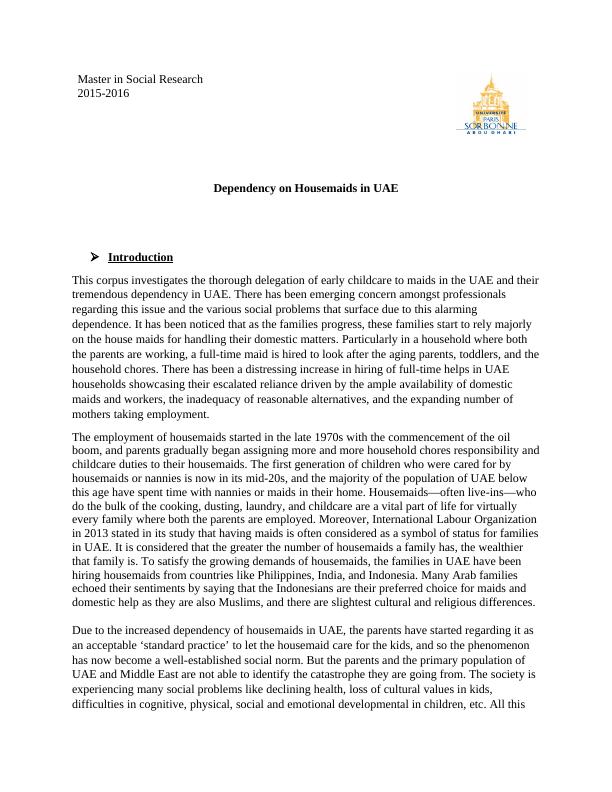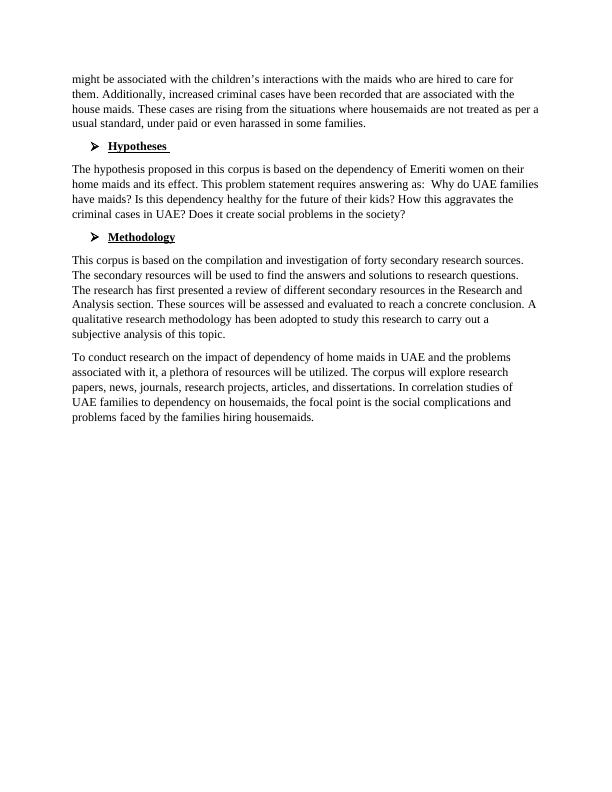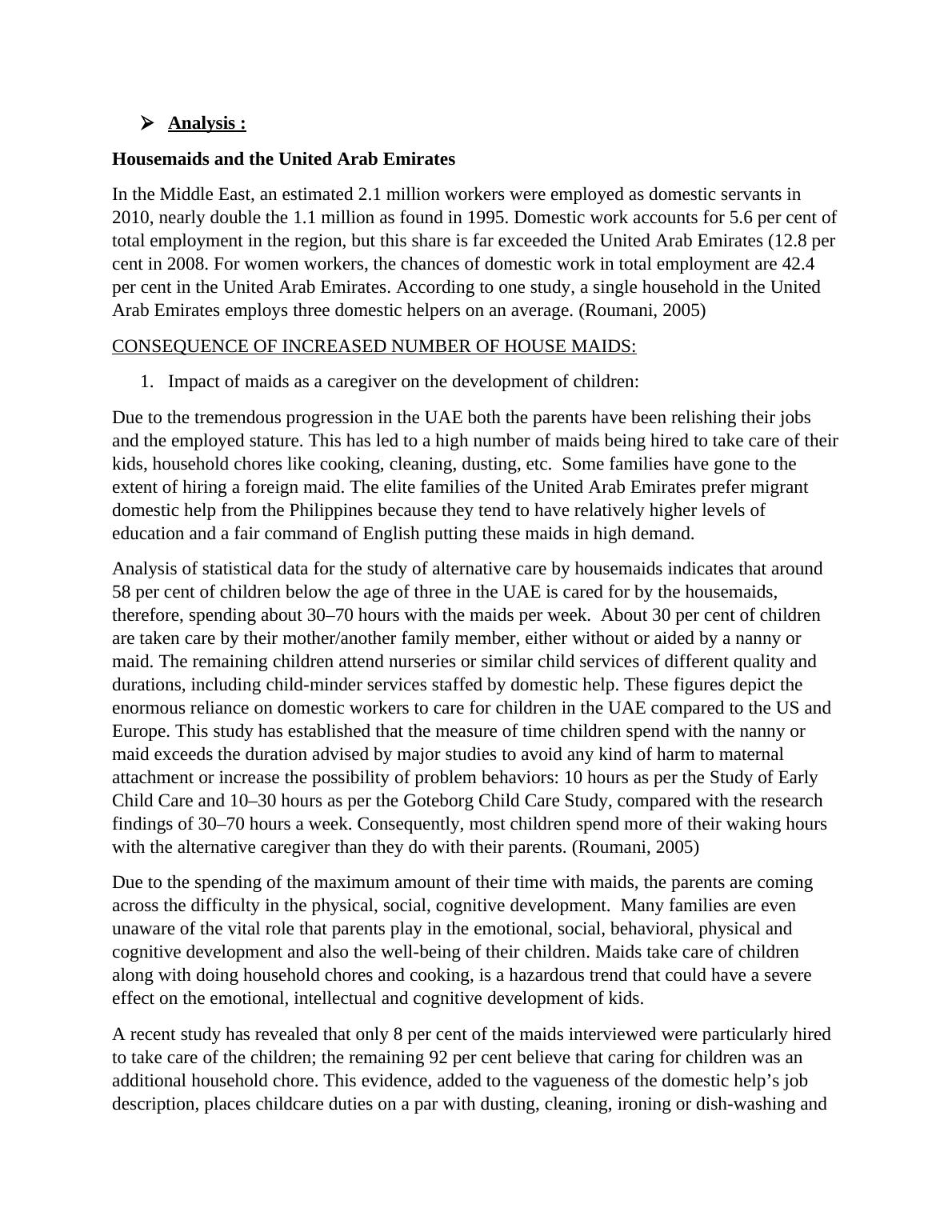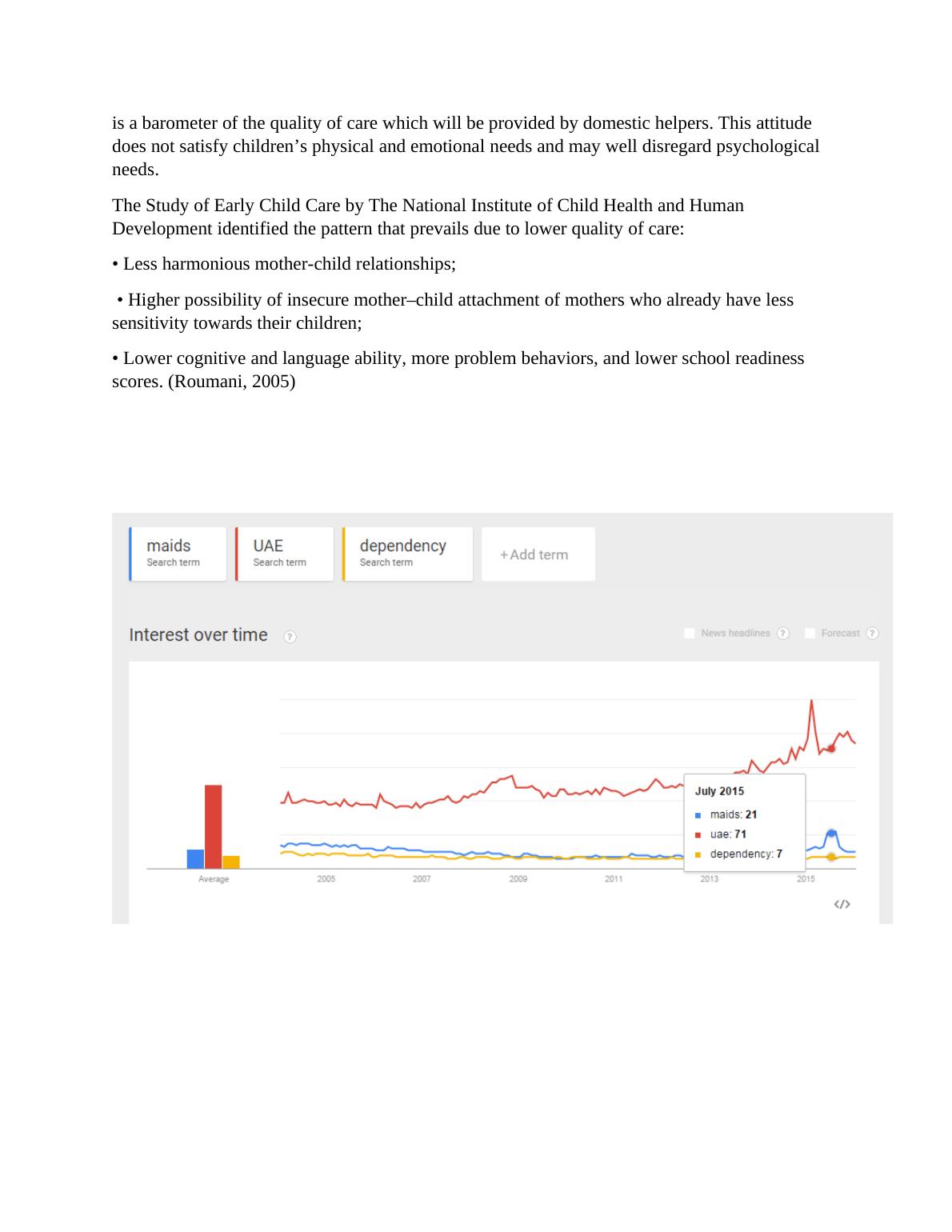Dependency on Housemaids in UAE: Impact on Children and Society
12 Pages4210 Words167 Views
Added on 2019-10-18
About This Document
This corpus investigates the thorough delegation of early childcare to maids in the UAE and their tremendous dependency in UAE. Due to the increased dependency of housemaids in UAE, the parents have started regarding it as an acceptable ‘standard practice’ to let the housemaid care for the kids, and so the phenomenon has now become a well-established social norm. The society is experiencing many social problems like declining health, loss of cultural values in kids, difficulties in cognitive, physical, social and emotional developmental in children, etc. All this might be associated with the children’s interactions with the maids who are hired to care for them.
Dependency on Housemaids in UAE: Impact on Children and Society
Added on 2019-10-18
ShareRelated Documents
Master in Social Research2015-2016Dependency on Housemaids in UAEIntroductionThis corpus investigates the thorough delegation of early childcare to maids in the UAE and theirtremendous dependency in UAE. There has been emerging concern amongst professionals regarding this issue and the various social problems that surface due to this alarming dependence. It has been noticed that as the families progress, these families start to rely majorly on the house maids for handling their domestic matters. Particularly in a household where both the parents are working, a full-time maid is hired to look after the aging parents, toddlers, and thehousehold chores. There has been a distressing increase in hiring of full-time helps in UAE households showcasing their escalated reliance driven by the ample availability of domestic maids and workers, the inadequacy of reasonable alternatives, and the expanding number of mothers taking employment.The employment of housemaids started in the late 1970s with the commencement of the oil boom, and parents gradually began assigning more and more household chores responsibility andchildcare duties to their housemaids. The first generation of children who were cared for by housemaids or nannies is now in its mid-20s, and the majority of the population of UAE below this age have spent time with nannies or maids in their home. Housemaids—often live-ins—who do the bulk of the cooking, dusting, laundry, and childcare are a vital part of life for virtually every family where both the parents are employed. Moreover, International Labour Organization in 2013 stated in its study that having maids is often considered as a symbol of status for familiesin UAE. It is considered that the greater the number of housemaids a family has, the wealthier that family is. To satisfy the growing demands of housemaids, the families in UAE have been hiring housemaids from countries like Philippines, India, and Indonesia. Many Arab families echoed their sentiments by saying that the Indonesians are their preferred choice for maids and domestic help as they are also Muslims, and there are slightest cultural and religious differences.Due to the increased dependency of housemaids in UAE, the parents have started regarding it as an acceptable ‘standard practice’ to let the housemaid care for the kids, and so the phenomenon has now become a well-established social norm. But the parents and the primary population of UAE and Middle East are not able to identify the catastrophe they are going from. The society is experiencing many social problems like declining health, loss of cultural values in kids, difficulties in cognitive, physical, social and emotional developmental in children, etc. All this

might be associated with the children’s interactions with the maids who are hired to care for them. Additionally, increased criminal cases have been recorded that are associated with the house maids. These cases are rising from the situations where housemaids are not treated as per ausual standard, under paid or even harassed in some families. Hypotheses The hypothesis proposed in this corpus is based on the dependency of Emeriti women on their home maids and its effect. This problem statement requires answering as: Why do UAE familieshave maids? Is this dependency healthy for the future of their kids? How this aggravates the criminal cases in UAE? Does it create social problems in the society? MethodologyThis corpus is based on the compilation and investigation of forty secondary research sources. The secondary resources will be used to find the answers and solutions to research questions. The research has first presented a review of different secondary resources in the Research and Analysis section. These sources will be assessed and evaluated to reach a concrete conclusion.A qualitative research methodology has been adopted to study this research to carry out a subjective analysis of this topic.To conduct research on the impact of dependency of home maids in UAE and the problems associated with it, a plethora of resources will be utilized. The corpus will explore research papers, news, journals, research projects, articles, and dissertations. In correlation studies of UAE families to dependency on housemaids, the focal point is the social complications and problems faced by the families hiring housemaids.

Analysis :Housemaids and the United Arab EmiratesIn the Middle East, an estimated 2.1 million workers were employed as domestic servants in 2010, nearly double the 1.1 million as found in 1995. Domestic work accounts for 5.6 per cent oftotal employment in the region, but this share is far exceeded the United Arab Emirates (12.8 percent in 2008. For women workers, the chances of domestic work in total employment are 42.4 per cent in the United Arab Emirates. According to one study, a single household in the United Arab Emirates employs three domestic helpers on an average. (Roumani, 2005)CONSEQUENCE OF INCREASED NUMBER OF HOUSE MAIDS:1.Impact of maids as a caregiver on the development of children:Due to the tremendous progression in the UAE both the parents have been relishing their jobs and the employed stature. This has led to a high number of maids being hired to take care of theirkids, household chores like cooking, cleaning, dusting, etc. Some families have gone to the extent of hiring a foreign maid. The elite families of the United Arab Emirates prefer migrant domestic help from the Philippines because they tend to have relatively higher levels of education and a fair command of English putting these maids in high demand.Analysis of statistical data for the study of alternative care by housemaids indicates that around 58 per cent of children below the age of three in the UAE is cared for by the housemaids, therefore, spending about 30–70 hours with the maids per week. About 30 per cent of children are taken care by their mother/another family member, either without or aided by a nanny or maid. The remaining children attend nurseries or similar child services of different quality and durations, including child-minder services staffed by domestic help. These figures depict the enormous reliance on domestic workers to care for children in the UAE compared to the US and Europe. This study has established that the measure of time children spend with the nanny or maid exceeds the duration advised by major studies to avoid any kind of harm to maternal attachment or increase the possibility of problem behaviors: 10 hours as per the Study of Early Child Care and 10–30 hours as per the Goteborg Child Care Study, compared with the research findings of 30–70 hours a week. Consequently, most children spend more of their waking hours with the alternative caregiver than they do with their parents. (Roumani, 2005)Due to the spending of the maximum amount of their time with maids, the parents are coming across the difficulty in the physical, social, cognitive development. Many families are even unaware of the vital role that parents play in the emotional, social, behavioral, physical and cognitive development and also the well-being of their children. Maids take care of children along with doing household chores and cooking, is a hazardous trend that could have a severe effect on the emotional, intellectual and cognitive development of kids.A recent study has revealed that only 8 per cent of the maids interviewed were particularly hired to take care of the children; the remaining 92 per cent believe that caring for children was an additional household chore. This evidence, added to the vagueness of the domestic help’s job description, places childcare duties on a par with dusting, cleaning, ironing or dish-washing and

is a barometer of the quality of care which will be provided by domestic helpers. This attitude does not satisfy children’s physical and emotional needs and may well disregard psychological needs.The Study of Early Child Care by The National Institute of Child Health and Human Development identified the pattern that prevails due to lower quality of care:• Less harmonious mother-child relationships; • Higher possibility of insecure mother–child attachment of mothers who already have less sensitivity towards their children; • Lower cognitive and language ability, more problem behaviors, and lower school readiness scores. (Roumani, 2005)

End of preview
Want to access all the pages? Upload your documents or become a member.
Related Documents
Early Intervention and Prevention Projects for Children in Povertylg...
|23
|7614
|61
Determinants of Health Affecting the Family - Nursing Assignmentlg...
|5
|905
|163
Mrs. Doubtfire: Family Movie Assessmentlg...
|7
|1475
|442
PSY202 Psychology Developmentlg...
|6
|1424
|36
